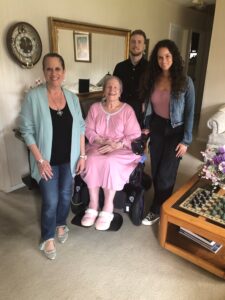Samaritan is a proud provider of Dementia Care and uniquely distinguished as a GUIDE provider by the Centers for Medicare and Medicaid (CMS). Click to learn more.
(856) 596-1600 available 24/7 Refer Now

At age 39, Tricia Tenore learned that she would never walk again. A spinal injury and a theft gone wrong in quick succession left her wheelchair bound. Despite these hardships, she lived life full of joy and happiness. Her family knew her as a gifted artist, educator, woman of faith, mother, and grandmother.
For Tricia, aging came along with a Congestive Heart Failure (CHF) diagnosis. Extreme breathing difficulties, a symptom of CHF, resulted in a few emergency hospitalizations and increased the complications of her other illness. It was at this time that Natalie Tenore, Tricia’s daughter and a clinician of over 40 years, recognized the end-of-life signs her mother was exhibiting. Her clinician experience had taught her that the most loving thing she could do was help her mom live the rest of life in comfort. She explained, “There is no greater gift that you have given to someone than to allow them to pass in peace and dignity.”
Over the next six months Samaritan’s hospice care team cared for Tricia and supported her family. A lifetime of difficulty navigating disability and healthcare support for Tricia left both Tricia and Ray, her husband, hesitant about care providers. Michael, Samaritan Clinical Manager, and Doreen, Samaritan Nurse on Tricia’s care team, took time to help explain the support that the team provided and reassured them that getting care and support would not be an issue.
“There’s nothing [no question] that’s too great for them,” says Natalie. She was awed not only by the clinical expertise of the Samaritan care team, but also their patience and compassion. Samaritan’s patient-centered approach to care means equipping patients and caregivers with the information they need to make the decisions that are right for their care and providing continued education so that patients truly understand the care and resources available to them. Nowadays, Ray shares with everyone how wonderful the compassionate hospice care Tricia received was and shares the importance of hospice for patients and families.
Witnessing what she described as a “group collaborative effort” from Samaritan to provide Tricia quality of life, time with her loved ones, dignity, and peace through the end-of-life touched Natalie deeply. She had assured her father, Ray, that “these people care” and she was proven right over and over during those six months. She says of the Samaritan hospice team, “I don’t think they are highlighted or commended enough. It takes a special person to help people manage the end-of-life.”
Tricia was able to receive in home care over the months in care, but when she needed 24/7 monitoring, the transition to Samaritan’s inpatient center (The Samaritan Center at Voorhees) was smooth and easy for the family.
When Tricia passed peacefully, Natalie, though grieving, was reassured that she had made sure her mom had the best care at end-of-life. She concluded, “It was a blessing to see my mother’s last few days be peaceful.”
Seeing members of Tricia’s care team, Hope and Lynn, at Tricia’s funeral was an uplifting moment for the family. In just six months, they had built a wonderful connection and had come to pay their respects and show their support for Ray, Natalie, and Tricia’s grandchildren. Natalie remarked, “they didn’t have to, but they chose to.”

“Palliative and hospice are amazing not only for the patient but also for their family.” As a clinician, Natalie knew this to be true, but her personal experience heightened her understanding of the impact hospice and palliative care has for caregivers. After Tricia’s passing, Ray was able to navigate the loss of his wife by turning to the bereavement counseling offered by Samaritan for hospice caregivers. The holistic care that Samaritan hospice service provides means that care extends to families too even after the passing of a patient.
Throughout her career Natalie has been an advocate for hospice and palliative care. Witnessing her mom’s excellent and gentle hospice care team in action strengthened her resolve to make sure that all caregivers and patients in need of end-of-life care do not miss out. She encourages families to engage in advance planning so that when the time comes, they know exactly how to support their loved one’s health wishes.